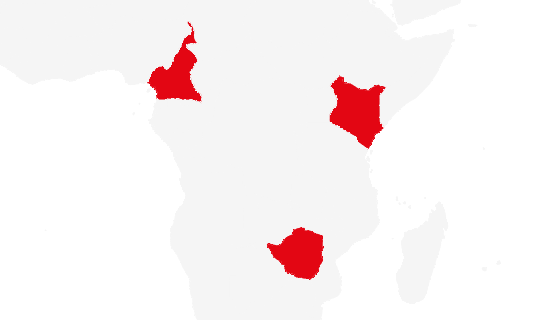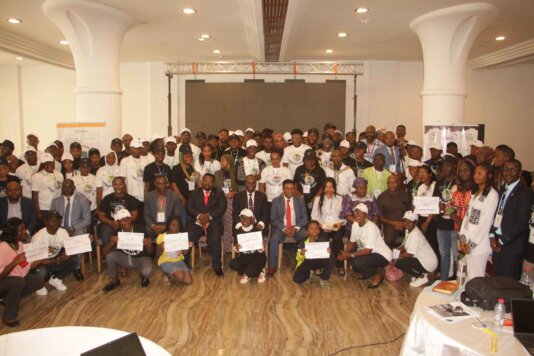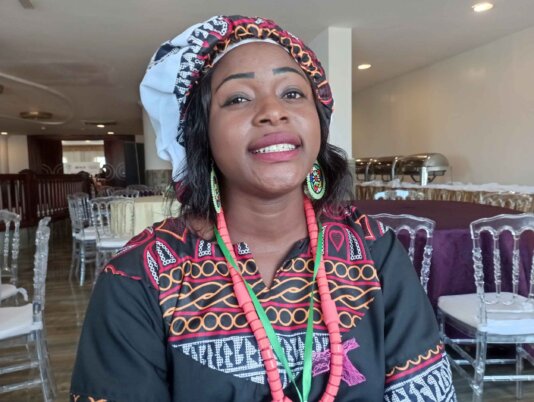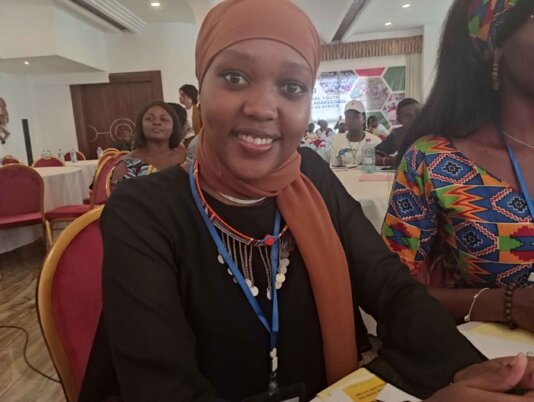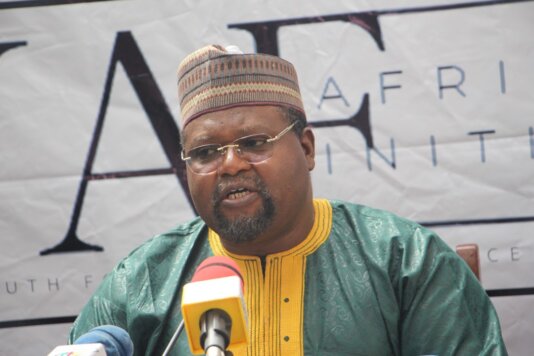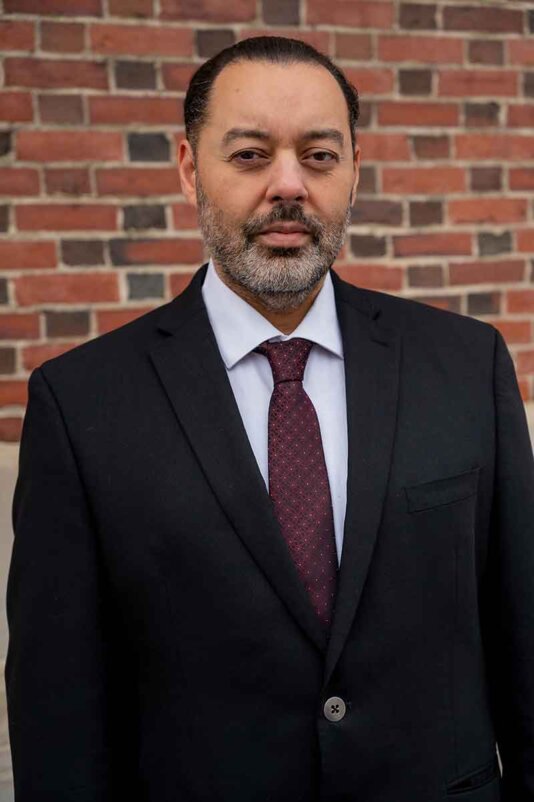- About
- Topics
- Picks
- Audio
- Story
- In-Depth
- Opinion
- News
- Donate
- Signup for our newsletterOur Editors' Best Picks.Send
Read, Debate: Engage.
| November 28, 2023 | |
|---|---|
| topic: | Climate action |
| tags: | #COP28, #climate change, #climate action, #Africa, #climate finance |
| located: | Cameroon, Zimbabwe, Kenya |
| by: | Ndi Eugene Ndi |
Felicia Motia was born to farmer parents whose only source of income was agriculture. Growing up in Mbonge Marumba, a rural locality in Cameroon's South West region, she saw her family grappling with poor yields as a result of shrinking rainfall and diminishing soil fertility.
As a young adult, Motia was determined to identify the root cause of the issue and seek solutions. She embarked on a research journey, primarily enrolling in online courses. "I realised the problem is climate change," she told FairPlanet, "and the solution is regenerative agriculture."
She has since been championing sustainable agriculture, advocating for practices that eschew archaic methods such as tillage and instead prioritise the use of organic manure. Traditional farming methods, like slash-and-burn, contribute to water evaporation and soil fertility erosion through excessive tillage. This leads to reduced agricultural productivity amid declining water availability.
Furthermore, the impacts of climate change, including elevated temperatures and altered rainfall patterns, negatively affect crop growth, which results in reduced productivity and yields. Motia has been training rural women in the Fako Division of the South West region of Cameroon, emphasising the production and utilisation of organic manure to enhance soil fertility.
But the effects of climate change, as Motia pointed out, extend beyond Cameroon, and young people across Africa are increasingly vocal about the urgent need for climate action.
Motia was among over 150 young leaders and climate activists from across Africa who took part in a three-day conference in Yaounde, Cameroon in mid-November titled the Youth Forum on Adaptation Finance in Africa (YOFAFA 2023). There, they discussed the undeniable impacts of climate change on the continent.
Recognising Africa’s growing adaptation finance gap and the great risk this poses to climate action on in Africa and globally, the young activists called on the international community to prioritise and more than double the amount of climate adaptation finance to the continent.
According to the UNDP Global Climate Promise, nine out of the ten countries most affected by climate change in 2020 were in Africa. And despite contributing less than four per cent of global greenhouse gas emissions, Africa bears the brunt of firsthand impacts, including severe droughts, floods, rising temperatures, sea-level changes and shifting precipitation patterns. These challenges may intensify in certain regions.
The continent requires USD 52.7 billion annually until 2030 to properly address climate adaptation challenges, according to the Global Center on Adaptation. Yet, Africa received only USD 11.4 billion from donors between 2019 and 2020 for this purpose.
The young leaders' demands are contained in "The Yaounde African Youth Call on More than Doubling Adaptation Finance for a Resilient Africa" - a position paper issued at the end of the conference on 18 November.
"Right now Zimbabwe is facing an El Niño, which may prolong till April," Fungai Ngorima, a young activist from Zimbabwe who attended YOFAFA 2023, told FairPlanet. "This means that our rainy season will be short and we are going to have less water."
Ngorima explained that Zimbabwe has been receiving erratic rainfall and that "rivers are drying up quickly, our livestock does not have water for drinking, humans do not have water for drinking, wildlife does not have water for drinking, and this is ending up in human-wildlife conflict over water resources."
The 2015-2016 devastating El Niño subjected the country to prolonged dry spells and reduced rainfall, impacting agricultural output and resulting in severe food and nutritional shortages, according to the United Nations Office for the Coordination of Humanitarian Affairs. The FAO’s Global Information and Early Warning System on Food and Agriculture [GIEWS] listed Zimbabwe as one of the Southern African countries likely to be hit by drought ahead of El Niño.
The Farming Early Warning Systems Network (FEW-NET) has warned that El Niño will result in below-average rainfall across Southern Africa, significantly impacting the upcoming 2023/2024 farming season in the region. "The rainfall deficits will likely result in below-average 2024 harvests," FEWS-NET said.
The situation in Kenya is similar, according to Shampi Anna of the Universities and Colleges Students’ Peace Association of Kenya (UCSPAK), an activist who focuses on the nexus between climate and peace and security.
"In the Northern part of Kenya, where I come from, we depend entirely on livestock as a means of livelihood," Anna told FairPlanet. Climate change-induced drying of pasture in the arid zone has driven pastoralists to migrate southward and graze their cattle on farmlands. This has triggered inter-tribal conflicts between pastoralists and agrarian communities, she said.
Droughts are becoming more frequent in Kenya, particularly in the drylands of Northern Kenya, where pastoralism contributes to 90 per cent of youth employment and provides 95 per cent of rural family income, as stated by the United Nations.
The National Drought Management Authority [NDMA] of Kenya emphasised the increasing regularity of droughts in the country, reporting that Kenya has lost 2.6 million livestock, with the remaining 10 million in the drylands experiencing a shortage of pasture and water. The depletion of pasture in the arid areas, it further stated, is worsened by high temperatures.
The young African leaders recognised the distressing impact of climate change on the continent, emphasising that the responsibility lies with nations that have contributed significantly to its causes.
"We, African youths call on industrialised countries and other big polluters to roll out a blueprint at COP28 to increase annual adaptation finance flows to Africa by more than double by 2025, and move from pledging to start keeping their promises," they stated in their common position document.
They specifically referenced the G7 countries, but the direct demand for increased adaptation finance was not explicitly directed at them.
According to the sixth assessment report (2023) by the Intergovernmental Panel on Climate Change (IPCC), Africa faces a temperature increase of 3°C to 6°C compared to pre-industrial levels by the turn of the century.
"This will result in more frequent and severe climate extremes, even in the best scenarios, which will have significant impacts on agriculture, water resources, and human health," the young African activists said in their declaration at the Yaounde conference.
They further noted that both increased warming and inaction could result in a reduction of crop yields by up to 50 per cent, an increase in water stress by up to 60 per cent, an increase in malaria incidence by up to 90 per cent and a loss of biodiversity by up to 40 per cent.
According to the African Development Bank (AfDB), climate change could reduce Africa's GDP by 2.8 per cent to 10 per cent by 2050, depending on the severity of the scenario. This could translate into a loss of USD 68 billion to USD 259 billion per year.
Considering these grim forecasts, African youths argue that reducing climate vulnerabilities on the continent "is, therefore, not only a moral imperative, but a strategic investment in the region’s future and resilience."
Yet, while the priority for Africa has been and remains adaptation, funding for climate action from the international community has been directed to mitigation - efforts to reduce or prevent emission of greenhouse gases - according to Dr Augustine Njamshi, Executive Director of African Coalition for Sustainable Energy and Access (ACSEA).
ACSEA co-hosted the Yaounde youth-led conference together with the Pan-African Climate Justice Alliance (PACJA) and in partnership with the African Adaptation Initiative (AAI).
"African countries are already suffering from the consequences of climate change and must adapt with it," Dr Njamshi said.
He argued that financing climate action should not be about preference [of donors] but priority [of those impacted]. "But, unfortunately, adaptation and adaptation finance has not yet taken central stage in climate action over the last decade," he lamented, supporting the call by African youths to "more than [double] adaptation finance for Africa."
The common youth position on climate adaptation finance in Africa will be presented at 28th Conference of the Parties of the United Nations Framework Convention on Climate Change (COP28), which will take place in Dubai between 30 November - 12 December.
The Yaounde conference of young African climate activists was held two weeks after the United Nations Environment Programme (UNEP) released its Adaptation Gap Report of 2023. The report reveals that adaptation is under-financed globally, with an existing gap of USD 194-366 billion per year until 2030.
"This means the current adaptation finance flows are 5-10 times below the estimated needs for developing countries," the youths said in their declaration.
At the COP26 in Glasgow, stakeholders vowed to double finance for climate adaptation globally from the 2019 levels by 2024. In 2019, the annual adaptation finance flow was roughly USD 20 billion.
"A doubling of efforts, as agreed in the Glasgow Climate Pact and reiterated by the G7 ministers, would bring adaptation finance into the vicinity of USD 40 billion," the youths said, an amount they say "would still fall short of the assessed need."
The UNEP report from earlier this month found that public multilateral and bilateral adaptation finance flows to developing countries declined by 15 per cent to USD 21 billion in 2021.
According to UNEP, every dollar invested in adaptation could yield four dollars in benefits. Moreover, adaptation could create new opportunities for economic diversification, innovation, job creation and social inclusion.
Independent experts have commended the involvement of the African youths in climate action, particularly their united stance on adaptation finance, but noted some potential gaps in their approach.
"I am proud of African youth for their tireless efforts to push for doubling adaptation finance for Africa's resilience," said Prof Fadhel Kaboub, President of the Global Institute for Sustainable Prosperity.
He, however, encourages the young leaders to dig deeper into the structural issues that have been overlooked in their demands for climate finance to be transformative.
"For that we need to emphasise strategic investments in food sovereignty and agroecology, renewable energy sovereignty (not exports), and high-tech industrial policies that prioritise the manufacturing of green energy, clean cooking and green transportation infrastructure," said the Tunisian-American Associate Professor of Economics.
"These are not only climate solutions, but also development, prosperity, and debt management solutions," said Kaboub.
Motia, Ngorima and Anna emphasise that until a viable solution to adaptation finance is established, Africa will endure the persistent impacts of climate change, despite being largely innocent of causing the crisis.
By copying the embed code below, you agree to adhere to our republishing guidelines.
